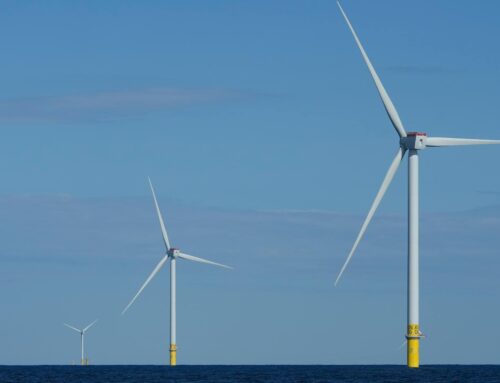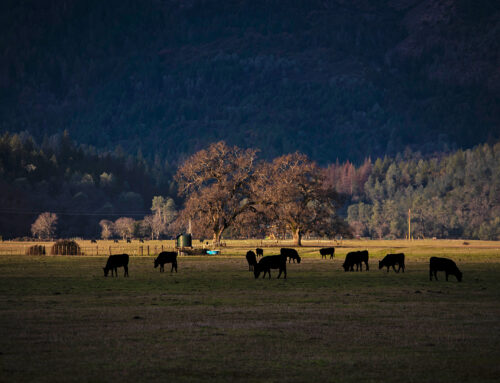Discounts, jobs and better services: Can community engagement create real support for rene
May 5, 2025
Europe’s energy sector is undergoing a rapid transformation.
Growth in renewable energy is breaking records, meeting a major milestone of 50 per cent of the European Union’s electricity demand last year, largely thanks to wind and solar energy.
This growth is expected to continue, giving the potential for €2.5 trillion in savings on energy bills across the EU by 2040. To reach the goals the bloc has set for itself, more solar panels and wind turbines need to be deployed, and more grid infrastructure must be rolled out to keep up with the transition.
But, while a majority of Europe supports the transition to green energy, there is a growing movement of those who oppose it. This opposition is slowing the uptake of renewables across the EU.
“Most Europeans support this shift. Across the continent, around four in five people consistently back wind power in public opinion polls,” says Guy Willems from the WindEurope association.
“But translating that support into actual infrastructure on the ground isn’t always straightforward. People are naturally protective of their surroundings. And in a world increasingly filled with disinformation, often amplified by high-profile political figures, public support for wind energy can’t be taken for granted.”
Disinformation is fuelling European anti-renewables movements
Sardinia, an island at the forefront of the climate crisis, is a good example of this trend. Last year, severe drought led to the island declaring a state of emergency with two of its prominent economic sectors, tourism and agriculture, heavily impacted.
It has the potential to become a pioneer in renewables, but efforts to centre its energy production on coal and fossil gas have undermined this transition. Disinformation campaigns from the anti-renewables movement have labelled it an “invasion”, stating that Sardinia is “under attack” from wind and solar projects, which will cause “irreversible devastation”.
Fuelled by this disinformation, local backlash prompted the Sardinian government to impose an 18-month moratorium on new wind and solar projects in July last year.
It isn’t just Sardinia where this stream of disinformation is holding up renewables projects. In France, a report published in April found that media outlets were spreading disinformation with a focus on renewable energy. This included claims that it was unreliable and harmful, polluting more than fossil fuels.
“The nuclear industry has a strong influence in France, as does the fossil fuel industry,” says Etienne Charbit from the French NGO réseau Cler.
“They undoubtedly help to fuel the anti-renewables movement in public debate. This influence, and insufficient government support, are among the main reasons why France is lagging behind its own renewable energy targets and is reluctant to commit to the deployment of renewables at the right pace and scale.”
Wind turbines? Not in my backyard
In Germany, an attitude of ‘Not in my Backyard’ (NIMBY) is holding up progress on wind power expansion. In 2024, the newly installed capacity was 3.25GW – well below the expansion target of 8GW.
A survey conducted by the German Economic Institute earlier this year found that, while there was a 54.7 per cent acceptance rate for the expansion of onshore wind, support for the construction of turbines decreases the closer proposals are to people’s homes.
Just 40 per cent of people in areas where there are no wind turbines said they would back new projects where they live. Opposition was strongest in areas where people were already aware of current plans for new wind turbines.
The survey showed noticeably higher levels of support for expansion (60 per cent) in areas where people already have wind turbines in their neighbourhood.
This public resistance to new renewable energy is also being fuelled by specific political parties. The far-right Alternative für Deutschland (AFD) party has called for Germany to tear down “the windmills of shame”.
It is a message that resonates with their supporters, too, as just 22.8 per cent are in favour of onshore wind energy expansion.
Disinformation doesn’t excuse a lack of local engagement
The spread of disinformation and anti-renewables rhetoric is hampering Europe’s transition to green energy, often with ambiguous motivations.
But it shouldn’t undermine the genuine concerns of the communities where these projects could potentially be constructed.
“The formation of anti-renewable energy organisations can also stem from legitimate concerns, like insufficient consideration of local needs and a lack of engagement of local communities during the different phases of projects,” says Charbit.
“It is therefore vital to share the benefits of these projects and to strengthen community involvement.”
It is a sentiment shared by Alexandros Koutras, project manager at the Electra Energy cooperative in Greece.
“Scepticism and mistrust toward energy projects have been a challenge for their long-term sustainable development. This is understandable, as many initiatives were top-down, profit-driven, and excluded local communities,” he acknowledges.
“Fair community benefit-sharing breaks this pattern by addressing local needs. Inclusion comes through participation, and when locals are involved in planning, designing, decision-making, and ownership, they become ambassadors of change.”
When projects like wind farms are co-owned, Koutras adds, people are more likely to take collective responsibility and tackle “bureaucratic barriers” and other challenges against them together, because they reap the rewards too.
Community engagement is crucial
Models of community engagement and benefit sharing for renewable energy projects can vary widely across Europe, according to a new report from Climate Action Network (CAN) Europe.
From financial compensation and job creation to electricity discounts, upgrades to public services or community funds, these benefits can come in many different forms. What we do know, however, is that people need to see direct, tangible and proportionate benefits from projects being built in their neighbourhoods.
“Engagement with local residents and relevant stakeholders needs to be early, accessible and continuous during the planning, development and operation of a renewable energy project,” says Seda Orhan, renewable energy programme manager at CAN Europe.
Orhan adds that this effort needs to start with policies so that there is a baseline for what constitutes ‘fair’ community engagement and benefit sharing.
For the first time ever, a cross-sector consensus has been reached between developers, local governments, civil society, and energy communities to define common principles for deploying renewable energy projects more efficiently and with increased community support.
The Fast and Fair Renewables & Grids initiative, facilitated by ICLEI Europe (Local Governments for Sustainability), fleshes out the notion of a fair deployment of renewable energy projects, with local value creation and community benefits as one of five priority pathways.
Developers have agreed on the importance of offering community benefits, such as direct funding, electricity discounts and co-ownership, where permitted by law. Business has also agreed that new projects should have an overall positive impact on nature and biodiversity, resolving a major point of conflict with environmental groups.
“All sides can finally point to commonly agreed principles on what constitutes a fair way to build, hopefully avoiding the complex disputes that have stalled renewable projects for years,” says Arthur Hinsch, senior expert in sustainable energy systems at ICLEI.
The shared principles also seek to empower municipal leaders and staff in rural areas, where a significant percentage of renewable projects are sited, in their roles as mediators and enablers of local energy transition.
What benefits can renewable energy projects bring to communities?
ACCIONA Energía, a renewable energy developer based in Spain, has recognised the advantages of ensuring that local communities are not just hosts, but active beneficiaries of sustainable development.
Its initiative in Hornillos de Cerrato, a municipality in Palencia, Spain, embodies this approach. Traditionally reliant on agriculture, it faced many of the same challenges seen in other rural areas, like declining populations and limited services.
ACCIONIA saw the potential for positive change. Working closely with local stakeholders, the developer integrated wind energy into the community in a way that complemented the town’s economic, cultural and environmental fabric.
The installation of 40 wind turbines, including the Celada Fusión wind farm, marked a turning point for Hornillos de Cerrato.
Beyond supplying renewable energy to approximately 40,000 homes, the project generated significant benefits. The town’s population grew from 110 in 2015 to 175 in 2023, reversing a long-standing decline. Revenue from the wind farms funded essential services such as a subsidised taxi service for the elderly, improved internet connectivity, and the construction of recreational facilities.
“Fair community benefit-sharing is pivotal in garnering public support and expediting permitting processes for renewable energy projects,” says Emma Reiners, director of communications at ACCIONA.
“Our experience in Hornillos de Cerrato underscores that when communities are integral to renewable energy projects, the outcomes transcend electricity generation – they rejuvenate communities, foster economic growth, and build lasting partnerships.”
Belgium’s SeaCoop is another successful example of involving communities in energy projects. It brought together 34 Belgian renewable energy communities to allow people to invest in offshore wind and harvest the energy for their own use.
In February this year, Seacoop was able to acquire 7 per cent of the Northwind wind farm. The revenue generated by this investment will be used to help citizens participate in the energy transition through heat pumps, renovations, electric car sharing and reducing energy poverty by bringing down their bills.
Philippe Awouters, managing director of SeaCoop, sees this as an important role for energy communities.
“Direct citizen ownership of renewable energy projects is an essential safeguard to garner social acceptance and accelerate the transition,” he says.
“In short: Power2thepeople via mill, baby, mill!”
Search
RECENT PRESS RELEASES
Related Post




